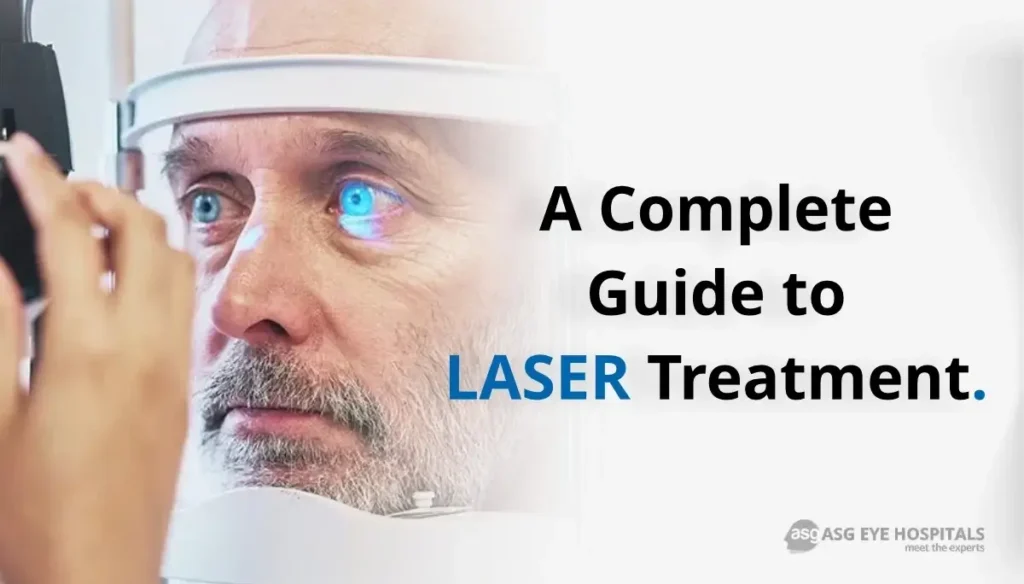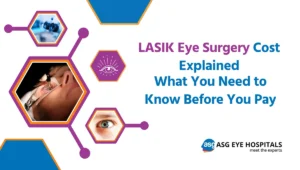Have you ever wondered how a camera focuses to capture a clear picture? Our eyes work similarly, with a natural lens that helps us see the world around us. However, sometimes this lens can become cloudy or distorted, leading to blurry vision. Eye laser surgery, also known as laser refractive surgery, is a modern solution to address common vision problems. In this blog, we will explore the causes, symptoms, and treatment options associated with eye laser surgery.
What Are The Main Causes Of Vision Problems?
Like a camera needing a lens adjustment, our eyes sometimes struggle to focus incoming light correctly. This can result in refractive errors like nearsightedness (far objects blurry), farsightedness (near objects blurry), astigmatism (distorted vision at all distances), and presbyopia (difficulty focusing close-up, especially after age 40). These conditions arise from variations in the shape or size of the cornea, the clear dome at the front of the eye.
1. Near-sightedness (Myopia)
It occurs when the eyeball is too long or the front part of the eye (cornea) is too curved. This causes light entering the eye to focus in front of the retina, resulting in distant objects appearing blurry.
Squinting, eyestrain, and difficulty in seeing objects at a distance are Myopia Symptoms
2.Farsightedness (Hyperopia)
It happens when the eyeball is too short or the cornea has too little curvature. This causes light to focus behind the retina, making close-up objects appear blurry.
Difficulty focusing on close objects, eye discomfort, and headaches are the symptoms of Hyperopia.
3. Astigmatism
Astigmatism is caused by an irregular shape of the cornea or lens, leading to blurred or distorted vision.
Symptoms of Blurred Vision
Headaches and eyestrain, Squinting and difficulty focusing, Double vision, Halos and glare around lights, Difficulty driving at night or in low light.
Eye Laser Treatment
Eye laser surgery is a safe and effective procedure designed to reshape the cornea, allowing light to focus correctly on the retina. This helps in reducing or eliminating the need for glasses or contact lenses.
Types of Laser Eye Surgery
- LASIK (Laser-assisted In situ keratomileusis): This is the most common types of laser eye surgery. It involves creating a thin flap on the cornea, which is lifted to allow the laser to reshape the underlying tissue. The flap is then repositioned, promoting quick healing.
- PRK: The outer layer of the cornea is removed, the laser reshapes the underlying tissue, and the outer layer gradually heals back.
- LASEK: Similar to LASIK, a thin layer of alcohol weakens the outer layer instead of creating a flap.
What is The Procedure of Laser Eye Surgery?
1. Preparation
- Comprehensive eye examination to assess eligibility
- Consultation with the surgeon to discuss risks and benefits
2. Anesthesia
- Anesthetic eye drops are administered for a painless experience.
3. LASIK Flap
- In LASIK, a thin corneal flap is created and lifted.
4. Laser Reshaping
- An excimer laser precisely sculpts the cornea based on the patient’s prescription.
5. Flap Replacement (LASIK) or Surface Smoothing (PRK)
- LASIK patients have the corneal flap repositioned.
- PRK involves direct laser treatment on the corneal surface.
6. Postoperative Care
- Prescribed eye drops and follow-up visits for monitoring.
- Rest and avoidance of strenuous activities during recovery.
7. Visual Recovery:
- Improved vision is typically noticed within days to weeks.
8. Long-Term Results
- Laser eye surgery often provides long-term vision correction.
- Periodic follow-ups may be needed for adjustments.
So, Is Laser Treatment Right For You?
It depends! While highly successful for many, certain factors affect candidacy, including the severity of your refractive error, your corneal thickness, and overall eye health. A comprehensive eye exam and consultation with your ophthalmologist are essential to determine your suitability.
What are the Pros and Cons of Eye Laser Surgery?
Pros:
- Improved vision without glasses or contacts
- Increased freedom and convenience
- Long-term cost savings compared to glasses or contacts
Cons:
- Cost can be significant
- Potential for side effects like dry eyes, glare, and halos
- Not everyone is a good candidate
- May not guarantee perfect vision
Eye laser treatment can be a transformative experience, granting sharper vision and liberating you from dependence on corrective lenses. However, careful consideration and realistic expectations are vital. Remember, it’s a medical procedure, not magic. Consult with the eye specialist in india, weigh the pros and cons, and make an informed decision that shines a light on your long-term vision health.


